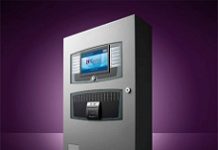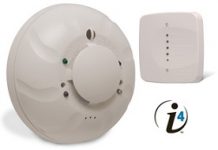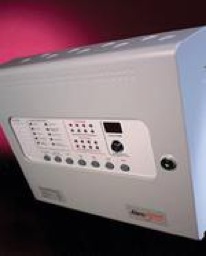Gamewell-FCI by Honeywell recently introduced the 4-Warn/CO detector to meet new code requirements and reduce material and labor costs by combining both fire and carbon monoxide (CO) detection into one device. Working with a number of New York City hotels, local Gamewell-FCI Distributor, Signature Building Systems, continues to utilize the 4-Warn/CO detector (part# MCS-COF) to ensure these facilities meet new requirements for commercial sleeping establishments.
New York City is one of an increasing number of municipalities across the U.S. that now require CO detection, in addition to fire detection, in newly constructed hotel guest rooms, as well as in other types of commercial sleeping occupancies. New York City code requires an audible, in-room alert when either fire or CO is detected. The detector must also report to a panel that reports to a central station that is monitored 24/7, with fire and CO alerts being communicated independently.
The 4-Warn/CO detector is used with an addressable sounder base that sends those required in-room alerts, using separate, distinctive signals for fire and CO. In addition to meeting central station reporting requirements, this same combo detector saves on installation costs while providing a more aesthetically pleasing solution in comparison with using separate detectors. The three devices are a smoke detector, a CO detector, and a sounder.
Signature Buildings Systems enlists electrical contractors, such as New York City-based FSM Electrical, to handle most of its fire alarm installations. FSM owner Faik Kahyaoglu estimates that using the 4-Warn/CO combination detector cuts installation time in-half when compared to installing separate CO and smoke detectors.
When utilized as part of a Gamewell-FCI E3 Series fire alarm and emergency communication system, the 4-Warn/CO detector’s sounder base can employ a one-of-a-kind silencing feature to temporarily shutdown audible fire or CO alerts when an emergency notification is issued. This exclusive silencing feature eliminates the common communication intelligibility issues caused by multiple audible alerts sounding simultaneously.
New York City was one of the first municipalities to adopt the new CO requirements for commercial buildings, added to the 2012 editions of International Building Code (IBC), International Fire Code (IFC) and NFPA 101: Life Safety Code. Geared toward newly constructed, commercial sleeping occupancies, these new codes can affect hotels, dormitories, apartment buildings, hospitals, daycare centers and nursing homes. As more regions adopt these newer code versions, demand for CO detectors that are cost-saving and code compliant is expected to increase rapidly. At the time of this release, all but 11 U.S. states have some type of CO detection legislation in-place.
To verify a true fire emergency, the 4-Warn/CO uses four sensing elements: smoke, CO, flame and heat. This measurement of multiple criteria has shown to significantly decrease nuisance alarms – a major challenge that is a common struggle for hotels and other lodging facilities.










